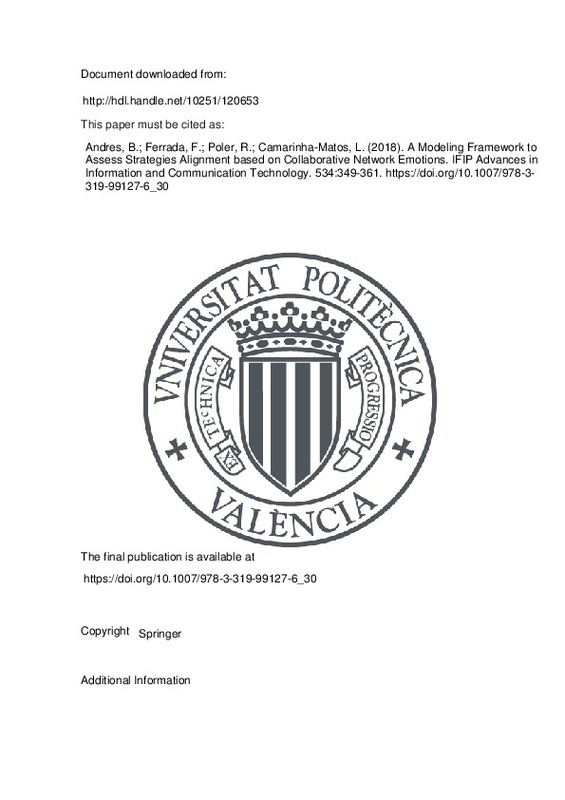Camarinha-Matos, L.M.: Collaborative networks in industry and the role of PRO-VE. Int. J. Prod. Manag. Eng. 2(2), 53–57 (2014)
Andres, B., Poler, R.: Models, guidelines and tools for the integration of collaborative processes in non-hierarchical manufacturing networks: a review. Int. J. Comput. Integr. Manuf. 2(29), 166–201 (2016)
Bititci, U., Martinez, V., Albores, P., Parung, J.: Creating and managing value in collaborative networks. Int. J. Phys. Distrib. Logist. Manag. 34(3/4), 251–268 (2004)
[+]
Camarinha-Matos, L.M.: Collaborative networks in industry and the role of PRO-VE. Int. J. Prod. Manag. Eng. 2(2), 53–57 (2014)
Andres, B., Poler, R.: Models, guidelines and tools for the integration of collaborative processes in non-hierarchical manufacturing networks: a review. Int. J. Comput. Integr. Manuf. 2(29), 166–201 (2016)
Bititci, U., Martinez, V., Albores, P., Parung, J.: Creating and managing value in collaborative networks. Int. J. Phys. Distrib. Logist. Manag. 34(3/4), 251–268 (2004)
Carbo, B.: Align the organization for improved supply chain performance. ASCET Proj. 2, 244–447 (2002)
Macedo, P., Camarinha-Matos, L.: Value systems alignment analysis in collaborative networked organizations management. Appl. Sci. 7(12), 123 (2017)
Andres, B., Poler, R.: A decision support system for the collaborative selection of strategies in enterprise networks. Decis. Support Syst. 91, 113–123 (2016)
Andres, B., Macedo, P., Camarinha-Matos, L.M., Poler, R.: Achieving coherence between strategies and value systems in collaborative networks. In: Camarinha-Matos, L.M., Afsarmanesh, H. (eds.) PRO-VE 2014. IFIP AICT, vol. 434, pp. 261–272. Springer, Heidelberg (2014). https://doi.org/10.1007/978-3-662-44745-1_26
Ferrada, F., Camarinha-Matos, L.M.: A system dynamics and agent-based approach to model emotions in collaborative networks. In: Camarinha-Matos, L.M., Parreira-Rocha, M., Ramezani, J. (eds.) DoCEIS 2017. IFIP AICT, vol. 499, pp. 29–43. Springer, Cham (2017). https://doi.org/10.1007/978-3-319-56077-9_3
Campuzano, F., Mula, J.: Supply Chain Simulation. A System Dynamics Approach for Improving Performance. Springer, London (2011). https://doi.org/10.1007/978-0-85729-719-8
Camarinha-Matos, L.M., Afsarmanesh, H.: Collaborative networks: a new scientific discipline. J. Intell. Manuf. 16(4–5), 439–452 (2005)
Vicsek, T.: Complexity: the bigger picture. Nature 418(6894), 131 (2002)
Sterman, J., Richardson, G., Davidsen, P.: Modelling the estimation of petroleum resources in the United States. Technol. Forecast. Soc. Chang. 33(3), 219–249 (1998)
Vlachos, D., Georgiadis, P., Iakovou, E.: A system dynamics model for dynamic capacity planning of remanufacturing in closed-loop supply chains. Comput. Oper. Res. 34(2), 367–394 (2007)
Campuzano-Bolarín, F., Mula, J., Peidro, D.: An extension to fuzzy estimations and system dynamics for improving supply chains. Int. J. Prod. Res. 51(10), 3156–3166 (2013)
Barton, P., Bryan, S., Robinson, S.: Modelling in the economic evaluation of health care: selecting the appropriate approach. J. Heal. Serv. Res. Policy 9(2), 110–118 (2004)
Eldabi, T., Paul, R.J., Young, T.: Simulation modelling in healthcare: reviewing legacies and investigating futures. J. Oper. Res. Soc. Spec. Issue Oper. Res. Heal. 58(2), 262–270 (2007)
Andres, B., Poler, R., Camarinha-Matos, L.M., Afsarmanesh, H.: A simulation approach to assess partners selected for a collaborative network. Int. J. Simul. Model. 16(3), 399–411 (2017)
Gohari, A., Mirchi, A., Madan, K.: System dynamics evaluation of climate change adaptation strategies for water resources management in central Iran. Water Resour. Manag. 31(5), 1413–1434 (2007)
Fishera, D., Norvell, J., Sonka, S., Nelson, M.J.: Understanding technology adoption through system dynamics modeling: implications for agribusiness management. Int. Food Agribus. Manag. Rev. 3, 281–296 (2000)
Lyneisa, J.M.: System dynamics for market forecasting and structural analysis. Syst. Dyn. Rev. 16(1), 3–25 (2000)
Borshchev, A., Filippov, A.: From system dynamics and discrete event to practical agent based modeling: reasons, techniques, tools. In: The 22nd International Conference of the System Dynamics Society (2004)
Ferrada, F.: C-EMO: A Modeling Framework for Collaborative Network Emotions Doctoral dissertation, Nova University of Lisbon, Portugal (2017). https://run.unl.pt/handle/10362/26857
Scherer, K.R.: Emotions are emergent processes: they require a dynamic computational architecture. Rev. Philos. Trans. R. Soc. Biol. Sci. 364(1535), 3459–3474 (2009)
[-]







![[Cerrado]](/themes/UPV/images/candado.png)


